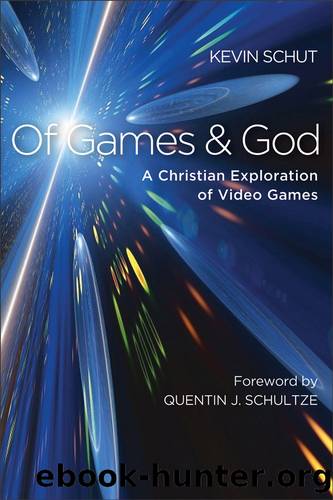Of Games and God by Kevin Schut

Author:Kevin Schut
Language: eng
Format: epub
Tags: REL012000, REL109030
ISBN: 9781441240514
Publisher: Baker Publishing Group
The School of Mario
The Brain, Education, and Video Games
Video games are not sinful, theyâre just stupid. And theyâre stupid in this way. Young, particularly men, and now women are joining it, they want to get on a team, be part of a kingdom, conquer a foe, and win a great, epic battle. So they do it with their thumbs and it doesnât even count. Nobodyâs really liberated. The Taliban is not really conquered. Women are not really freed from oppression. Generations are not really changed. Itâs all fake. It doesnât count.
Pastor Mark Driscoll of Mars Hill Church in Seattle[1]
Making School Cool with Games?
Is anything as big a waste of time as video games? A player pours tears, sweat, and gallons of virtual blood into something that results in little more than an unsatisfying victory cut sceneâif he or she even finishes the game.[2] Could there be a less productive activity? Then why on earth would a bunch of intellectuals and educational experts today be arguing that schools should start taking video games more seriously? They donât mean to push students into the relatively low-paid career of game testing. No, this coalition of respectable academics, intelligent game developers, and wide-eyed technology boosters argues that video games are the equivalent of an exercise gym for the mind. The video-game medium, so the argument goes, engages us mentally in just the way that we should be engaged in a digital culture. This is a pretty significant claim, and would certainly go a long way toward redeeming the medium if it were true.
This chapter looks at these claims about the benefits of video games and also considers some critiques. First, weâll examine the complaints lodged against todayâs digital media environment. Then, weâll look at the new enthusiasm for video games as tools of education and social reform. Weâll evaluate both of these sets of arguments with the help of media ecology theory, a body of work partly based on the work of media guru Marshall McLuhan. In the end, weâll see that video games are neither a panacea for all our ills nor a destroyer of all that is good. Rather, they bring intellectual changes that are both positive and negative, and it is our responsibility to engage the new medium wisely.
Digital Media Critics
The title of Mark Bauerleinâs 2008 book is unsubtle: The Dumbest Generation: How the Digital Age Stupefies Young Americans and Jeopardizes Our Future (Or: Donât Trust Anyone Under 30). It neatly summarizes his main contention. Young people today, argues Bauerlein, have squandered an incredibly rich media environment:
The fonts of knowledge are everywhere, but the rising generation is camped in the desert, passing stories, pictures, tunes, and text back and forth, living off the thrill of peer attention. Meanwhile, their intellects refuse the cultural and civic inheritance that has made us what we are up to now.[3]
Susan Jacoby, author of The Age of American Unreason, likewise connects todayâs digital environment (along with Christian fundamentalism) with a surge of anti-intellectualism in todayâs American culture.
Download
This site does not store any files on its server. We only index and link to content provided by other sites. Please contact the content providers to delete copyright contents if any and email us, we'll remove relevant links or contents immediately.
| Adult Ministry | Children's Ministry |
| Counseling & Recovery | Discipleship |
| Evangelism | Missions & Missionary Work |
| Preaching | Sermons |
| Youth Ministry |
Victory over the Darkness by Neil T. Anderson(2868)
The Rape Of Nanking by Iris Chang(2824)
Chosen by God by R. C. Sproul(2165)
Habits of Grace by David Mathis(1984)
Crash the Chatterbox by Steven Furtick(1978)
Knowing God by J.I. Packer(1860)
How To Be Born Again by Billy Graham(1782)
A Prophet with Honor by William C. Martin(1727)
Gospel-Shaped Marriage by Chad van Dixhoorn(1719)
Peace with God by Billy Graham(1691)
Confronting Christianity by Rebecca McLaughlin(1593)
God's Smuggler by Brother Andrew(1549)
Angel Dreams by Virtue Doreen Virtue Melissa(1483)
Whisper by Mark Batterson(1459)
The School of Biblical Evangelism by Ray Comfort(1438)
Missionaries by Norman Lewis(1430)
The Truth War by John MacArthur(1426)
The Poems of Rowan Williams by Rowan Williams(1358)
Do Greater Things by Robby Dawkins(1329)
